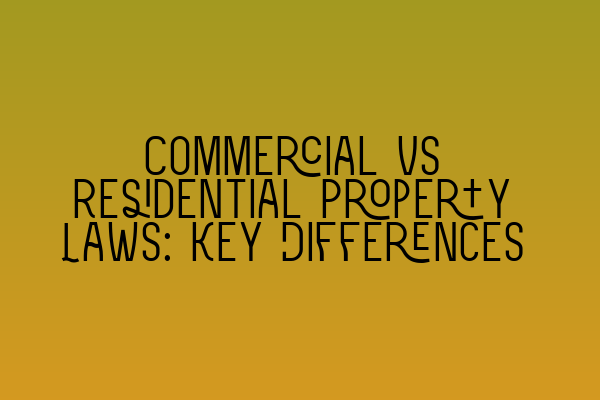Commercial vs Residential Property Laws: Key Differences
As a solicitor specializing in property law, it’s crucial to understand the various nuances between commercial and residential property laws. While both types of properties involve legal aspects, there are some significant differences that must be taken into account.
In this blog post, we will explore the key differences between commercial and residential property laws, helping you navigate these distinct areas with ease. Whether you are a property owner, investor, or aspiring solicitor, understanding these differences is crucial for success in the property market.
1. Ownership and Use
One of the primary differences between commercial and residential properties lies in their ownership and use. Residential properties are typically owned by individuals or families and are used as a place of residence. On the other hand, commercial properties are generally owned by businesses or investors and are utilized for commercial purposes, such as offices, retail spaces, or industrial units.
2. Contractual Considerations
The contractual considerations in commercial and residential property transactions also differ significantly. Commercial properties often involve more complex and detailed contracts due to the larger financial investments and higher stakes involved. These contracts may include provisions for lease terms, rent reviews, break clauses, and repairs, among other things. In contrast, residential property contracts tend to be more straightforward, with a focus on the sale or lease of the property itself.
3. Tenant Rights and Obligations
The rights and obligations of tenants in commercial and residential properties also vary. Commercial tenants usually have fewer legal protections compared to residential tenants. For instance, commercial leases often have longer terms, and tenants may be responsible for a wider range of expenses, including repairs and maintenance. Residential tenants, on the other hand, benefit from statutory protections, such as the right to a safe and habitable living environment and protection against unfair eviction.
4. Planning and Zoning Regulations
Another critical distinction between commercial and residential property laws lies in the planning and zoning regulations that apply to these properties. These regulations dictate how properties can be developed, used, and modified. Commercial properties often face more stringent planning and zoning requirements, as they must conform to specific guidelines related to their commercial purpose, location, and impact on the community. Residential properties, while still subject to some regulations, typically have fewer restrictions.
5. Finance and Tax Considerations
Finance and tax considerations differ between commercial and residential properties as well. Commercial properties are often more expensive to finance, and lenders may require a larger down payment and higher interest rates. Additionally, commercial property transactions may attract different tax implications compared to residential properties, such as capital gains tax and VAT. It’s essential to work with a knowledgeable solicitor to ensure compliance with the relevant financial and tax obligations.
In conclusion, understanding the key differences between commercial and residential property laws is crucial for anyone operating in the property market. Whether you are a property owner, investor, or aspiring solicitor, having a solid grasp of these distinctions will help you navigate the legal landscape more effectively.
If you’re looking to expand your knowledge of property law or prepare for the Solicitors Qualifying Exam (SQE), we recommend checking out our related articles for further study:
– SQE 1 Practice Exam Questions: SQE 1 Practice Exam Questions
– SQE 1 Practice Mocks FLK1 FLK2: SQE 1 Practice Mocks FLK1 FLK2
– SQE 2 Preparation Courses: SQE 2 Preparation Courses
– SQE 1 Preparation Courses: SQE 1 Preparation Courses
– SRA SQE Exam Dates: SRA SQE Exam Dates
At SQE Property Law & Land Law, we offer comprehensive courses and resources to help you succeed in your property law journey. Contact us today to learn more about our expert guidance and support.
Disclaimer: This blog post is intended for informational purposes only and should not be construed as legal advice. Consult with a qualified solicitor for personalized advice on your specific property law matters.
